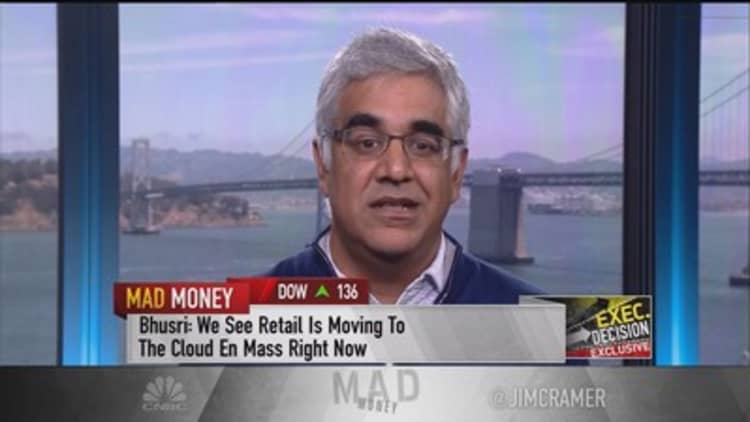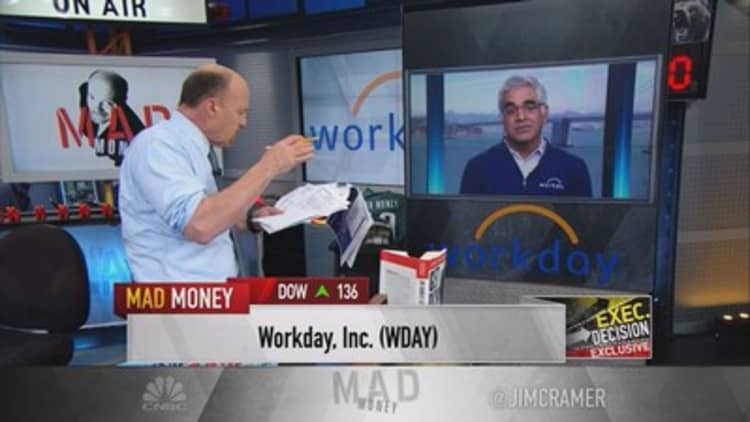
After cloud application provider Workday reported a strong quarter with several major clients like Nasdaq expanding services, CEO Aneel Bhusri gave a simple reason why companies are choosing his software platform over larger rivals like SAP and Oracle.
"It all comes back to having a great product and taking care of customers," Bhusri told "Mad Money" host Jim Cramer on Thursday. "Where I think we've really carved out our success has been at the high end of the enterprise, these very large companies where we're really the only proven solution in the marketplace."
A recent Goldman Sachs survey of CIOs showed that IT professionals are turning to Workday at the expense of Oracle and SAP.
Bhusri said that with a customer satisfaction rate of roughly 97 percent, it is not hard to see how that factors in to the financial and human capital management company's gain in market share.
Watch the full segment here:

"That really matters in today's world. It's not just about selling the cloud, it's about delivering the cloud for these companies," he told Cramer.
With subscription revenues up over 42 percent year over year and total revenues up 38 percent, Workday is certainly cementing its space in the cloud.
The company proudly enlisted major retailers Amazon, Wal-Mart, and Target as clients this year, making a strong foray into serving some of the sector's strongest names.
Workday is also developing machine learning software that can help predict scenarios as varied as whether those clients will pay Workday on time or if an employee is thinking about resigning.
"This is that huge move towards machine learning, which I believe is not going to replace jobs, it's just going to make people more effective," Bhusri said. "We're able to look at a massive amount of data and based on things like their current salary, how long has it been since they were recently promoted, how competitive is that job outside the company, we can make a prediction whether that person is likely to leave in the next 12 months. And that's very useful to an HR organization or to a CEO who's trying to maintain their top talent and keep their top talent at the company."
Despite Workday's first-quarter operating losses of $60.2 million, Bhusri said the statistic that most of the industry looks at, the non-GAAP operating margin, was strong, spiking 12.7 percent.
"That's significantly ahead of where we even thought we would come out," the CEO admitted. "And I'm not sure that's going to be repeatable forever, or at least in the foreseeable future, [but] I think it just demonstrates the scalability and positive nature of our business model."
And as major clients like 21st Century Fox sign on to receive more of Workday's services, its standing in the cloud space is only becoming more prominent.
"We're beginning to get those proof points, along with the Netflixes of the world and the Aons of the world, that large companies are beginning to move their financial systems to the cloud. So it's a very exciting time for us," the CEO said.
In response to Bhusri's statements on Workday's competition, SAP told CNBC in an email that it stood by its strategy.
"Name calling is certainly one way to attract attention," SAP said. "We prefer to dedicate our energy to working with our customers and ending bias in the workplace with machine learning, as well as supporting today's workforce demands with continuous performance management."
Questions for Cramer?
Call Cramer: 1-800-743-CNBC
Want to take a deep dive into Cramer's world? Hit him up!
Mad Money Twitter - Jim Cramer Twitter - Facebook - Instagram - Vine
Questions, comments, suggestions for the "Mad Money" website? madcap@cnbc.com



